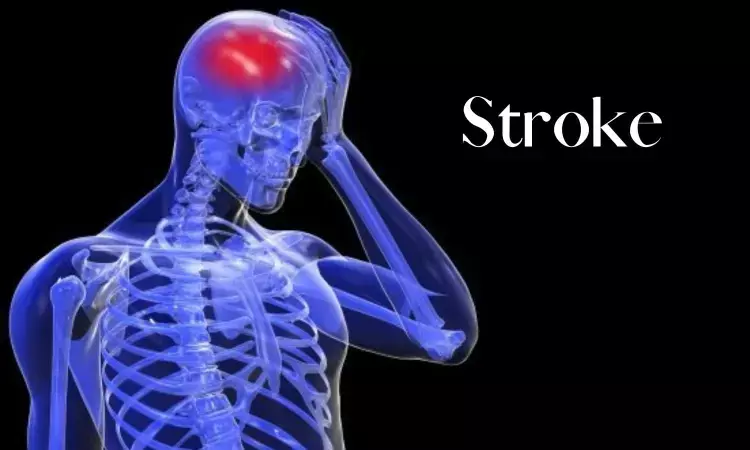- Home
- Medical news & Guidelines
- Anesthesiology
- Cardiology and CTVS
- Critical Care
- Dentistry
- Dermatology
- Diabetes and Endocrinology
- ENT
- Gastroenterology
- Medicine
- Nephrology
- Neurology
- Obstretics-Gynaecology
- Oncology
- Ophthalmology
- Orthopaedics
- Pediatrics-Neonatology
- Psychiatry
- Pulmonology
- Radiology
- Surgery
- Urology
- Laboratory Medicine
- Diet
- Nursing
- Paramedical
- Physiotherapy
- Health news
- Fact Check
- Bone Health Fact Check
- Brain Health Fact Check
- Cancer Related Fact Check
- Child Care Fact Check
- Dental and oral health fact check
- Diabetes and metabolic health fact check
- Diet and Nutrition Fact Check
- Eye and ENT Care Fact Check
- Fitness fact check
- Gut health fact check
- Heart health fact check
- Kidney health fact check
- Medical education fact check
- Men's health fact check
- Respiratory fact check
- Skin and hair care fact check
- Vaccine and Immunization fact check
- Women's health fact check
- AYUSH
- State News
- Andaman and Nicobar Islands
- Andhra Pradesh
- Arunachal Pradesh
- Assam
- Bihar
- Chandigarh
- Chattisgarh
- Dadra and Nagar Haveli
- Daman and Diu
- Delhi
- Goa
- Gujarat
- Haryana
- Himachal Pradesh
- Jammu & Kashmir
- Jharkhand
- Karnataka
- Kerala
- Ladakh
- Lakshadweep
- Madhya Pradesh
- Maharashtra
- Manipur
- Meghalaya
- Mizoram
- Nagaland
- Odisha
- Puducherry
- Punjab
- Rajasthan
- Sikkim
- Tamil Nadu
- Telangana
- Tripura
- Uttar Pradesh
- Uttrakhand
- West Bengal
- Medical Education
- Industry
Poor Sleep quality associated with increased risk of stroke

Researchers have found in a new study that People who have sleep problems may be more prone to have a stroke.Sleep problems included getting too much or too little sleep, taking long naps, having poor quality sleep, snoring, snorting and sleep apnea. In addition, those who had five or more of these symptoms had an even greater risk of stroke. The study does not show that sleeping problems cause stroke. It only shows an association.
The study was published in the April 5, 2023, online issue of Neurology®.
“Not only do our results suggest that individual sleep problems may increase a person’s risk of stroke but having more than five of these symptoms may lead to five times the risk of stroke compared to those who do not have any sleep problems,” said study author Christine Mc Carthy, MB, BCh, BAO, of University of Galway in Ireland. “Our results suggest that sleep problems should be an area of focus for stroke prevention.”
The international study involved 4,496 people, including 2,243 people who had a stroke who were matched to 2,253 people who did not have a stroke. The average age of participants was 62.
Participants were asked about their sleep behaviors including how many hours of sleep they got, sleep quality, napping, snoring, snorting and breathing problems during sleep.
People who slept for too many or too few hours were more likely to have a stroke than people who slept an average number of hours. A total of 162 of those who had a stroke got less than five hours of sleep, compared to 43 of those who did not have a stroke. And 151 of those who had a stroke got more than nine hours of sleep a night, compared to 84 of those who did not have a stroke.
Researchers found that people who got less than five hours of sleep were three times more likely to have a stroke than those who got seven hours of sleep on average. People who got more than nine hours of sleep were more than two times as likely to have a stroke than those who got seven hours a night.
People who took naps longer than one hour were 88% more likely to have a stroke than those who did not.
Researchers also looked at breathing problems during sleep, including snoring, snorting and sleep apnea. People who snored were 91% more likely to have stroke than those who did not and people who snorted were nearly three times more likely to have a stroke than those who did not. People with sleep apnea were nearly three times more likely to have a stroke than those who did not.
Following extensive adjusting for other factors that could affect the risk of stroke such as smoking, physical activity, depression and alcohol consumption, the results remained similar.
“With these results, doctors could have earlier conversations with people who are having sleep problems,” Mc Carthy said. “Interventions to improve sleep may also reduce the risk of stroke and should be the subject of future research.”
A limitation of the study was that people reported their own symptoms of sleep problems, so the information may not have been accurate.
Reference:
Christine Eileen Mc Carthy, Salim Yusuf, Conor Judge, Alberto Alvarez-Iglesias, Graeme J. Hankey, Shahram Oveisgharan, Albertino Damasceno, Helle Klingenberg Iversen, Annika Rosengren, Alvaro Avezum, Patricio Lopez-Jaramillo, Denis Xavier, Xingyu Wang, Sumathy Rangarajan, Martin O'Donnell Neurology Apr 2023, 10.1212/WNL.0000000000207249; DOI: 10.1212/WNL.0000000000207249.
Dr Kamal Kant Kohli-MBBS, DTCD- a chest specialist with more than 30 years of practice and a flair for writing clinical articles, Dr Kamal Kant Kohli joined Medical Dialogues as a Chief Editor of Medical News. Besides writing articles, as an editor, he proofreads and verifies all the medical content published on Medical Dialogues including those coming from journals, studies,medical conferences,guidelines etc. Email: drkohli@medicaldialogues.in. Contact no. 011-43720751


